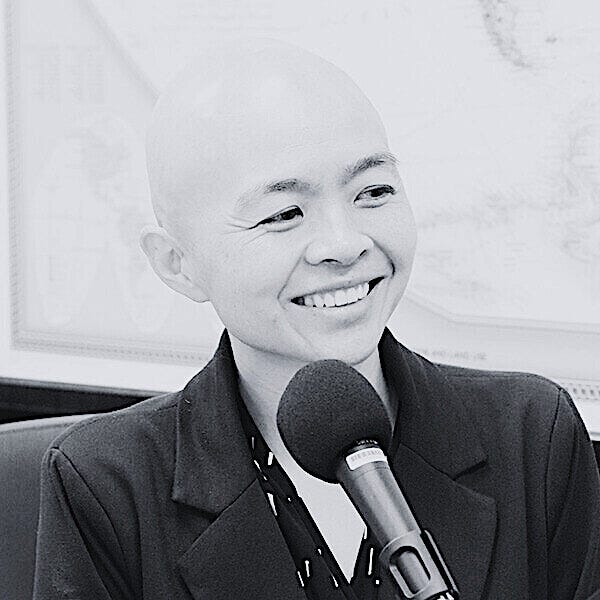Remembering Melissa Inouye
Our Accidental Theologian of Grace
After a long battle with cancer, Melissa Wei-Tsing Inouye died last week at age 44. Melissa will be remembered, I suspect, for the qualities that caught my attention the first time I heard her speak about ten years ago: her rare candor and compassion on the hard problem of Zion belonging across social division. On the issues that perennially draw Latter-day Saint intellectual discussion—power and privilege, margin and center, faithfulness and critique, one familiar beat after another—Melissa consistently delivered original analysis together with warm, but never sentimental, description of Mormon community. I have never heard my own soul-grounding experience of lived religion articulated with such light as I heard it in Melissa’s words.
Every time she wrote or spoke, she seemed to thread the unthreadable needle on topics like patriarchy, racism, and human brokenness with faithful, informed truth-telling and common-sense realism about the work of making community. Melissa’s twin intellectual legacies will be 1) her relentless attention to the Church outside of North America, especially the new spiritual horizons opened by the experiences of global Saints and the moral imperative that falls on North American Saints to heed their voices; and 2) her signature approach of faithful repentance, the way she was able to communicate resilient loyalty to the institutional Church in her urgent call to repentance for the ways we have failed to love each other.
Melissa had the gift of intra-cultural tongues. To a feminist alienated by the Church’s patriarchal structure or a young person disillusioned by a glimpse of unsavory institutional sausage-making, she made it clear that she understood their frustration and pain—indeed, could often sharpen their critique with her own historically-informed perspective. To somebody like me, an institutionalist in my bones and quick to defend the Church, she also showed that she got it: the delight of singing with children, the satisfaction of sweeping a gym floor after a ward dinner, the oxygen of sisters who give and receive one another in trust.
To both types, though, she showed a better way, a way beyond knee-jerk, partisan defense or critique—and beyond the collateral wounding of real people and actual relationships that so often follows.
And so I not only expect but hope that these contributions will be the Inouye legacy. I hope that a hundred new pieces will be written about the global church in her honor, that her brand of faithful repentance will inspire a thousand new scholars.
What I personally cherish most from Melissa’s intellectual legacy, though, is something rather different. My favorite piece she ever wrote is an obscure little tale in her memoir Crossings, “The Sweaty Sprout.” It’s an email update she wrote to her family recounting a disastrous train journey from Nanjing to humid Shanghai, her newborn strapped to her chest and a villainous wheeled suitcase thwarting her efforts at every turn. It’s funny and descriptive and poignant. It illustrates the maxim Melissa had recently coined about life in China: “China giveth, and China taketh away.” For all the sweaty, dispiriting resistance that the long journey and the evil luggage offered, there were strangers who helped at crucial moments and an angelic newborn sleeping on her chest. In the end, she concludes that “China giveth.”
Melissa was pragmatic, not poetic, a historian who was at best an accidental philosopher. She often disclaimed any aptitude for theology. So my devotion to “The Sweaty Sprout” as a crucial text in Mormon theology struck Melissa as ridiculous. Still, though, I maintain that this short essay—and Crossings’ treatment of China as a whole—represents the most compelling figurative exploration of grace in contemporary Mormon letters.
In Crossings, China shows up as a location, a history, a home, and a case study. It’s where Melissa lived, what she studied, where some of her ancestors were from. But over the course of the dozens of short essays that make up the memoir, China also becomes something less historical and more metaphorical, more theological. China becomes a microcosm of the world as the spiritual ground of our lives. More specifically, China becomes a metaphor for the way that the world gives us space both to act and to be acted upon: China giveth, and China taketh away.
China, as a miniature working model of the world, gives itself to Melissa in overwhelming sensory availability. She describes shining loops of road-flattened rat intestine, bursts of ginger-and-scallion dumpling between the teeth, wet markets bustling with animal and vegetable life (and death). But China also takes away. In the symbol of the evil, cheaply-made baggage, China resists her, thwarts her will, gives her headaches, exceeds her grasp. It’s because of this resistant quality, however, that China ultimately becomes a place where love can be given and received—between mother and child, between a family and its prodigal member, between strangers on a train. China giveth.
For my money, Melissa has here created our tradition’s most compelling literary representation of a genuinely Mormon—that is to say, immanent and relational—concept of grace: not grace as a unilateral reprieve from an all-powerful God to depraved humanity, but grace as the very quality of creation, fully integrated with the here and now in palpable, ubiquitous, interpersonal ways. Grace that gives us space to act, and grace that acts upon us. As one (actual, not accidental) philosopher puts it, “Grace—as immanent, enabling, prodigal, suffered, absolute, and sufficient—is a name for what is unconditionally given.”1 This is grace that is real and abundant all around us, but that, in its very resistance, stringently shifts our spiritual center of gravity outside of our own life, our own interests, our own plans. Grace that recruits us into other people’s lives. Grace that calls us to act for and on behalf of others. Grace that leads strangers to walk an extra half hour through a hot, crowded train station dragging an apparently possessed wheeled suitcase.
Whether Melissa would have ever recognized a theology of grace in her picture of China, it is grace of precisely this sort that is so movingly and concretely worked out in her last book, Sacred Struggle. It’s the basic model of the world she works out in Crossings—a world that produces love as a byproduct of its giving and its taking—that allows her to explore suffering with such power in Struggle. The “struggle” of the title names precisely the resistant quality of China, its grace that is also a headache and a lot of hard work. China, I submit, is what taught her to seek Christ on what she memorably called the path of most resistance: “This path of most resistance is the path to becoming as God now is. Seeking to return to our heavenly parents, becoming one family, covenanting with one another, becoming as They are through the Atonement of Christ, is the work of Zion.”
Nowhere is the world’s grace more resistant or more available than in the work of building Zion across political, cultural, national, and generational divides. And nobody better understood the urgency of Zion’s summons than Melissa Inouye. Especially near the end of her life, she came to see the Restoration’s Zion theology as our great gift to the Christian tradition, and discerning what this gift would demand of us became her obsession. “We may not understand each other,” she wrote, “but we are fundamentally oriented toward each other as we seek God—not just turning our faces up to the heavens, but also beholding each other across the world’s wide divides. This horizontal orientation finds expression not only in our theology, but also in our organization at the grassroots, in people-to-people networks and connections cultivated not only locally, but all over the world.” She herself was tireless in the hard, sweaty work of cultivation, and she never tired of calling her compatriots to join her in the sacred struggle.
China demanded the unimaginable from Melissa. It will take as much from each of us. But Melissa understood that offering our lives willingly to God’s work, preempting death’s demand, makes beauty from ashes. What I first offer cannot be wrested from me. “I have learned to trust Christ’s promise in the midst of life’s sacred struggles. His Spirit will be with us, and among us, when we ask Him to consecrate our struggles and make us equal to the privilege of living a life full of life. We receive its bitterness as well as its joy, deepening our capacity for love, wisdom, and the kinds of work Gods do.”
Melissa Inouye’s was a life full of life. She poured it out doing the kinds of work Gods do. May we be equal to the Zion road she mapped—across China and beyond.
Rosalynde Welch is the Associate Director of the BYU Maxwell Institute.
OBITUARIES AND REMEMBRANCES
Adam S. Miller, Speculative Grace: Bruno Latour and Object-Oriented Theology (Fordham University Press, 2013), Kindle location 241.









Thank you for sharing these beautiful thoughts